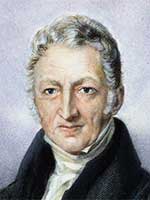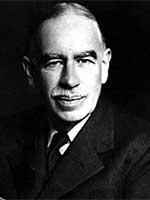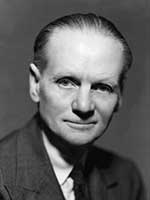
Thomas Malthus
Brits econoom en demograaf
Leefde van: 1766 - 1834
Categorie: Economie en ondernemers Land: ![]() Verenigd Koninkrijk
Verenigd Koninkrijk
Geboren: 13 februari 1766 Gestorven: 23 december 1834
Over Thomas Malthus
Thomas Robert Malthus (Rookery, 17 februari 1766 – St Catherine, 23 december 1834) was een Brits demograaf, econoom en predikant. Hij staat bekend om zijn pessimistische (Malthus was een misantroop) maar zeer invloedrijke meningen.
Malthus werd beroemd doordat hij wees op de potentiële gevaren van bevolkingsgroei: "Het vermogen van de mens tot bevolkingsgroei is onbegrensd veel groter dan het vermogen van de aarde om voor de mens een bestaan te produceren". Als anglicaanse predikant zag Malthus deze situatie als de manier waarop God de mens deugdzaam gedrag oplegde: hij beschouwde optimistische ideeën van sociale hervormingen als gedoemd te mislukken.
Hij legde zijn lezers dus een dystopische, negatieve kijk op de wereld voor, dit in tegenstelling tot de utopia's van schrijvers zoals Rousseau en William Godwin. De ramp die zich voordoet wanneer de groei van de beschikbare middelen achterblijft bij de bevolkingsgroei staat bekend als een malthusiaanse catastrofe.
Bron Wikipedia
Boeken van Thomas Malthus
Citaten 1 t/m 10 van 13.
-
De herhaling van ellende te voorkomen ligt, helaas! buiten de macht der mens.
Origineel:To prevent the recurrence of misery is, alas! beyond the power of man.
An Essay on The Principle of Population (1798) V, 25, 4-5.
Voor de volledige tekst zie: www.marxists.org― Thomas Malthus -
De kracht van de bevolking is zo veel groter dan de kracht van de aarde om het voedsel voor de mens te produceren, dat voortijdig sterven, in een of andere vorm, bij de mensheid langs zal komen.
Origineel:The power of population is so superior to the power in the earth to produce subsistence for man, that premature death must in some shape or other visit the human race.
An Essay on The Principle of Population (1798) VII, 20, 2-4.
Voor de volledige tekst zie: www.marxists.org― Thomas Malthus -
Het is gebleken dat door de onvermijdelijke natuurwetten, sommige mensen genoodzaakt zijn te lijden onder gebrek. Dit zijn de ongelukkige personen die, in de grote loterij van het leven, een blanco hebben getrokken.
Origineel:It has appeared that from the inevitable laws of our nature, some human beings must suffer from want. These are the unhappy persons who, in the great lottery of life, have drawn a blank.
An Essay on The Principle of Population (1798) X, 29, 1-15― Thomas Malthus -
Indien niet afgeremd, neemt de populatie volgens een meetkundige verhouding toe. Voedsel neemt slechts volgens een rekenkundige verhouding toe.
Origineel:Population, when unchecked, increases in a geometrical ratio, Subsistence, increases only in an arithmetical ratio.
An Essay on The Principle of Population (1798) I, 18, 1-2― Thomas Malthus -
De mens kan niet te midden van overvloed leven.
Origineel:Man cannot live in the midst of plenty.
An Essay on The Principle of Population (1798) X, 7, 1― Thomas Malthus -
De vraag is: wat is sparen?
Origineel:The question is, what is saving?
Principles of Political Economy (1836) Book I, Chapter I― Thomas Malthus -
Een veer zal een weegschaal doen uitslaan als er niets tegenover staat.
Origineel:A feather will weigh down a scale when there is nothing in the opposite one.
Principles of Political Economy (1836) II, I, V― Thomas Malthus -
Het is niet de meest plezierige baan om acht uur per dag in een telhuis door te brengen.
Origineel:It is not the most pleasant employment to spend eight hours a day in a counting house.
Principles of Political Economy (1836) II, I, IX― Thomas Malthus -
Het kwaad bestaat niet in de wereld om wanhoop te creëren, maar activiteit.
Origineel:Evil exists in the world not to create despair but activity.
An Essay on The Principle of Population (1798) XIX, 15, 1― Thomas Malthus -
Ik denk dat zal blijken dat ervaring, de ware bron en fundering van alle kennis, onveranderlijk de waarheid ervan bevestigt.
Origineel:I think it will be found that experience, the true source and foundation of all knowledge, invariably confirms its truth.
― Thomas Malthus


 John Maynard Keynes
John Maynard Keynes Alfred Marshall
Alfred Marshall Norman Angell
Norman Angell